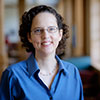This article is more than 5 years old.
Derrik and I deliberately attended separate breakout sessions in almost every time slot.
Emma Cryer of Duke spoke on Open Access Marketing. During Open Access Week 2009, Duke sponsored multiple panels targeted to different audiences, such as Librarians, Graduate Students, Faculty, and (taking advantage of Parents Weekend) Parents. Outcomes of the experience:
- More consultations with the Scholarly Communications Officer,
- An Open Access policy proposal (still under development), and
- More comfort with Open Access questions among the public service and liaison librarians.
Future directions include: more workshops (instead of panels), bringing in an Open Access publisher, and specialized toolkits.
Another Monday session focused on ER librarian duties and training for same. A graph of typical ER duties roughly matched my past experience and Derrik’s job description. The speakers concluded that LIS programs do not prepare librarians for these duties. Attendees were challenged to provide internships and workshops to help our current and future colleagues. During the discussion I asked the audience to help me crowdsource some internship ideas. The ideas mentioned:
- Mapping DLF/ERMI terms for an ERMS
- Licensing and budgeting (no specifics given)
- Fixing e-journal links
- That Someday/Maybe list of projects we never get around to
- Making a list of print+electronic journals (Chris has done that for ZSR)
- Shadowing each Resource Services librarian and doing micro-projects with each.
Tuesday morning I attended a theoretical presentation on “use.” The speaker averred that we over-emphasize transactional use like COUNTER, Ref questions, and circulation statistics. I did not write down The Answer for doing this better, but I did make a note to push the PRS service the next time I write my faculty about anything.
During Tuesday’s longish lunch break, I strolled over to the campus art museum to view a special exhibit on Paolo Veronese. As this shameless Flickr plug reveals, I really dig Veronese.
During another Tuesday session librarians from the University of Northern Colorado described a reorganization of workflow that resulted in 3 full-time employees adding e-journal link checking to their jobs. (They may eventually delegate this work to student assistants, but they wanted to get a feel for the nature of the work first.) FixZak has not risen to this level of service yet. If a problem is reported in, say, InformaWorld we often check other InformaWorld titles to determine the breadth of the problem, but we go no further. At UNC, the public services staff clamored for this pro-active checking.
The final Tuesday presentation featured Rick Lugg from R2 Consulting. The question was whether we should centralize or decentralize ER workflows and The Answer was clearly decentralize, i.e., make e-resources part of everyone’s job.
On Wednesday I went to a copyright presentation. It was mostly familiar territory, but one interesting nugget is that the U. California system negotiated with Springer to put all UC-authored articles into Springer’s Open Choice program and into the UC IR.
One final rant: It has become fashionable of late to say “issue” when you really mean “problem.” Fine. But it is very confusing if the “issue” is because you can’t access an “issue,” e.g. v.9 n.2. Gah!!
Once I recovered from the harrowing pre-dawn, icy drive to the airport, my trip was quite enjoyable. My hotel room featured a photograph of the Santa Rita oil well. Visit my Flickr site to see how the town of Texon, which grew up around this well, looked in 2006.

2 Comments on ‘Carol at ER&L 2010’
Carol, you know I always like a shameless Flickr plug! That is an interesting internship idea list!
The trip to the storage stacks didn’t work out?